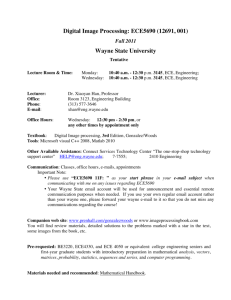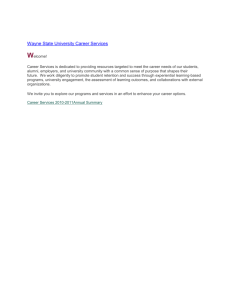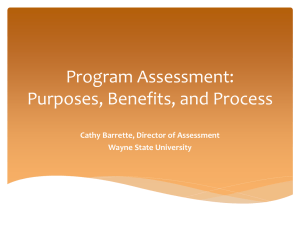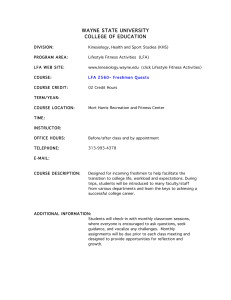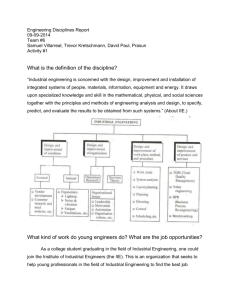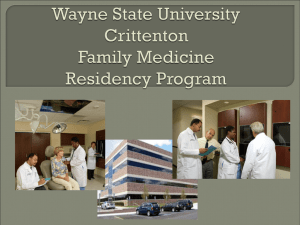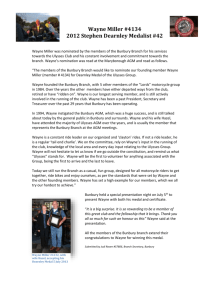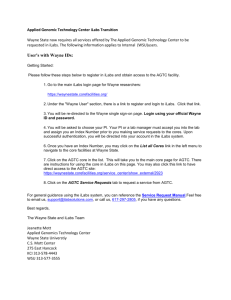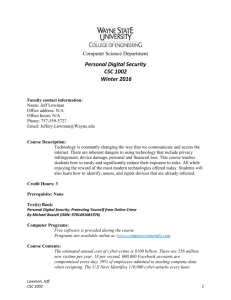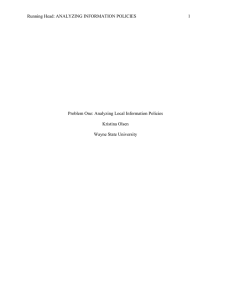Syllabus Checklist
advertisement
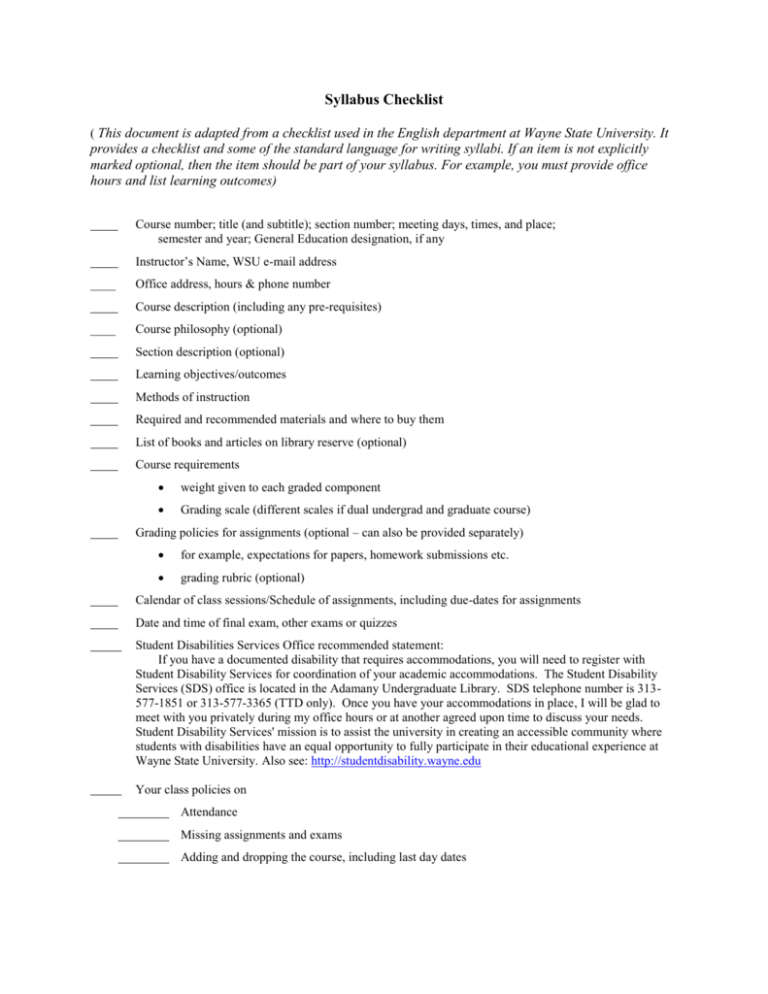
Syllabus Checklist ( This document is adapted from a checklist used in the English department at Wayne State University. It provides a checklist and some of the standard language for writing syllabi. If an item is not explicitly marked optional, then the item should be part of your syllabus. For example, you must provide office hours and list learning outcomes) Course number; title (and subtitle); section number; meeting days, times, and place; semester and year; General Education designation, if any Instructor’s Name, WSU e-mail address ____ Office address, hours & phone number Course description (including any pre-requisites) ____ Course philosophy (optional) Section description (optional) Learning objectives/outcomes Methods of instruction Required and recommended materials and where to buy them List of books and articles on library reserve (optional) Course requirements weight given to each graded component Grading scale (different scales if dual undergrad and graduate course) Grading policies for assignments (optional – can also be provided separately) for example, expectations for papers, homework submissions etc. grading rubric (optional) Calendar of class sessions/Schedule of assignments, including due-dates for assignments Date and time of final exam, other exams or quizzes Student Disabilities Services Office recommended statement: If you have a documented disability that requires accommodations, you will need to register with Student Disability Services for coordination of your academic accommodations. The Student Disability Services (SDS) office is located in the Adamany Undergraduate Library. SDS telephone number is 313577-1851 or 313-577-3365 (TTD only). Once you have your accommodations in place, I will be glad to meet with you privately during my office hours or at another agreed upon time to discuss your needs. Student Disability Services' mission is to assist the university in creating an accessible community where students with disabilities have an equal opportunity to fully participate in their educational experience at Wayne State University. Also see: http://studentdisability.wayne.edu Your class policies on Attendance Missing assignments and exams Adding and dropping the course, including last day dates Withdrawals, including the grade that will be assigned to students who do not officially withdraw from the course before the drop deadline University policy on Incompletes: The mark of I—Incomplete, is given to either an undergraduate or a graduate student when he/she has not completed all of the course work as planned for the term and when there is, in the judgment of the instructor, a reasonable probability that the student can complete the course successfully without again attending regular class sessions. The student should be passing at the time the grade of ‘I’ is given. A written contract specifying the work to be completed should be signed by the student and instructor. Responsibility for completing all course work rests with the student (2011-2013 WSU Undergraduate Bulletin, 41). Academic misbehavior: Cheating and Plagiarism Instructors should describe their penalties and policies for cases of plagiarism and cheating—e.g., failing grade for the assignment; failing grade for the course; report to the Department, the College of Liberal Arts and Sciences, the University Student Conduct Officer; etc. Academic misbehavior means any activity that tends to compromise the academic integrity of the institution or subvert the education process. All forms of academic misbehavior are prohibited at Wayne State University, as outlined in the Student Code of Conduct (http://doso.wayne.edu/codeofconduct.pdf). Students who commit or assist in committing dishonest acts are subject to downgrading (to a failing grade for the test, paper, or other courserelated activity in question, or for the entire course) and/or additional sanctions as described in the Student Code of Conduct. Cheating: Intentionally using or attempting to use, or intentionally providing or attempting to provide, unauthorized materials, information or assistance in any academic exercise. Examples include: (a) copying from another student’s test paper; (b) allowing another student to copy from a test paper; (c) using unauthorized material such as a "cheat sheet" during an exam. (d) unauthorized access to a test from a previous semester also constitutes cheating. Fabrication: Intentional and unauthorized falsification of any information or citation. Examples include: (a) citation of information not taken from the source indicated; (b) listing sources in a bibliography not used in a research paper. Plagiarism: To take and use another’s words or ideas as one’s own. Examples include: (a) failure to use appropriate referencing when using the words or ideas of other persons. (b) altering the language, paraphrasing, omitting, rearranging, or forming new combinations of words in an attempt to make the thoughts of another appear as your own. Other forms of academic misbehavior include, but are not limited to: (a) unauthorized use of resources, or any attempt to limit another student’s access to educational resources, or any attempt to alter equipment so as to lead to an incorrect answer for subsequent users; (b) enlisting the assistance of a substitute in the taking of examinations; (c) violating course rules as defined in the course syllabus or other written information provided to the student; (d) selling, buying or stealing all or part of an un-administered test or answers to the test; (e) changing or altering a grade on a test or other academic grade records. WSU Resources for Students Student Disability Services (SDS) http://studentdisability.wayne.edu/ Academic Success Center http://www.success.wayne.edu/ Counseling and Psychological Services (CAPS) http://www.caps.wayne.edu Dean of Students’ Office http://www.doso.wayne.edu College of Liberal Arts & Sciences: http://clasweb.clas.wayne.edu/CurrentStudents Departmental Website
